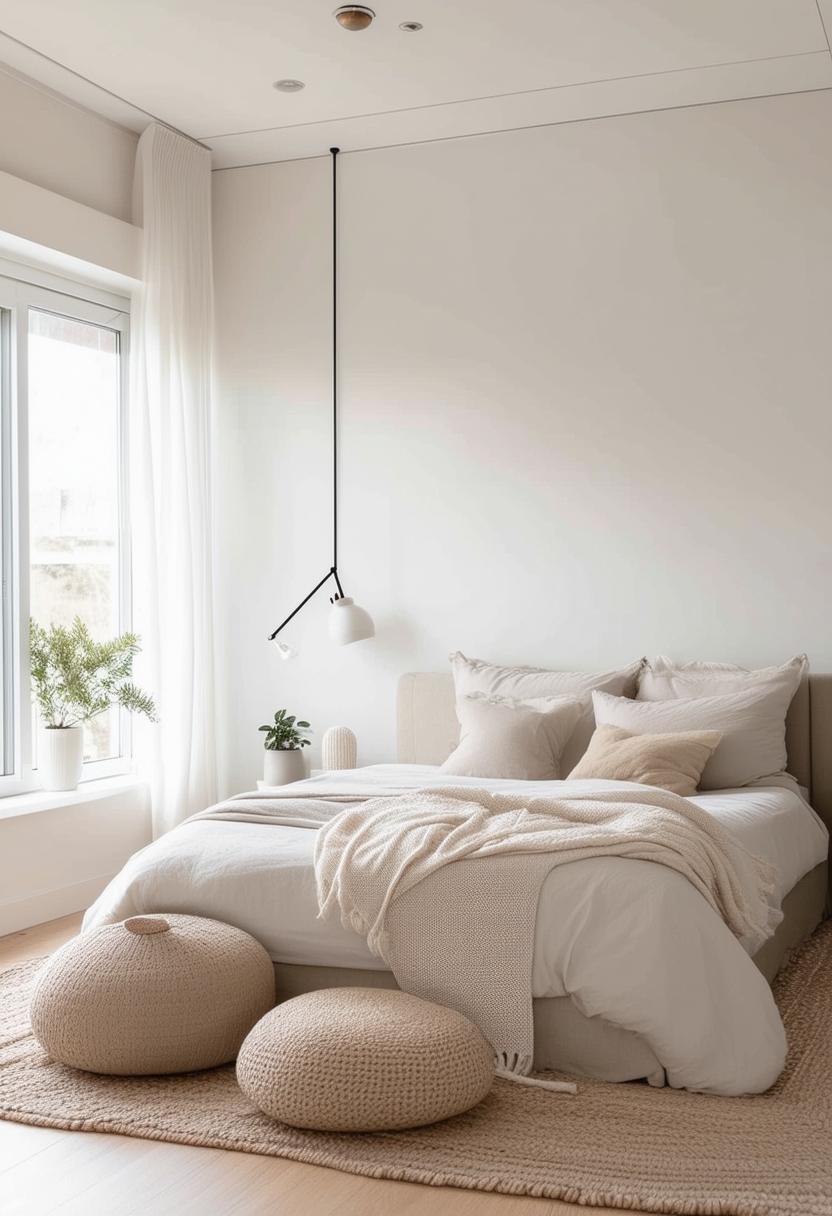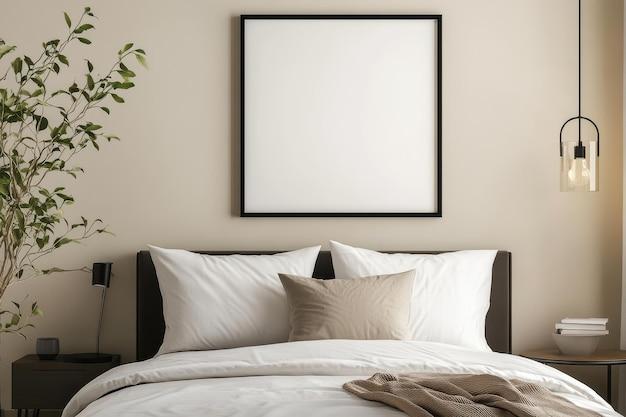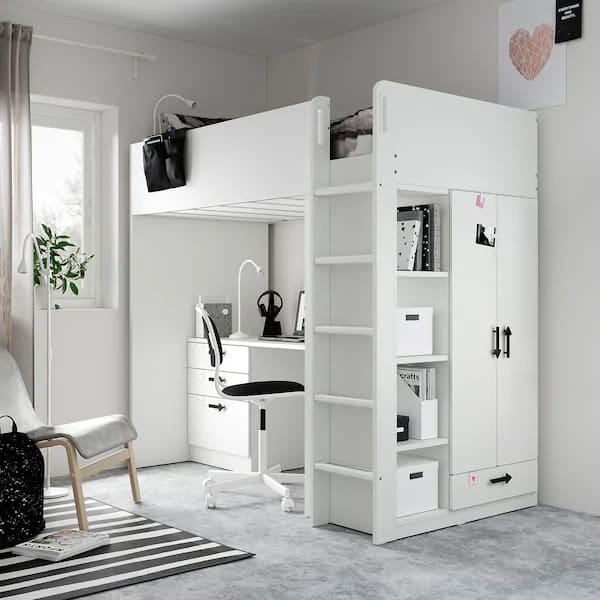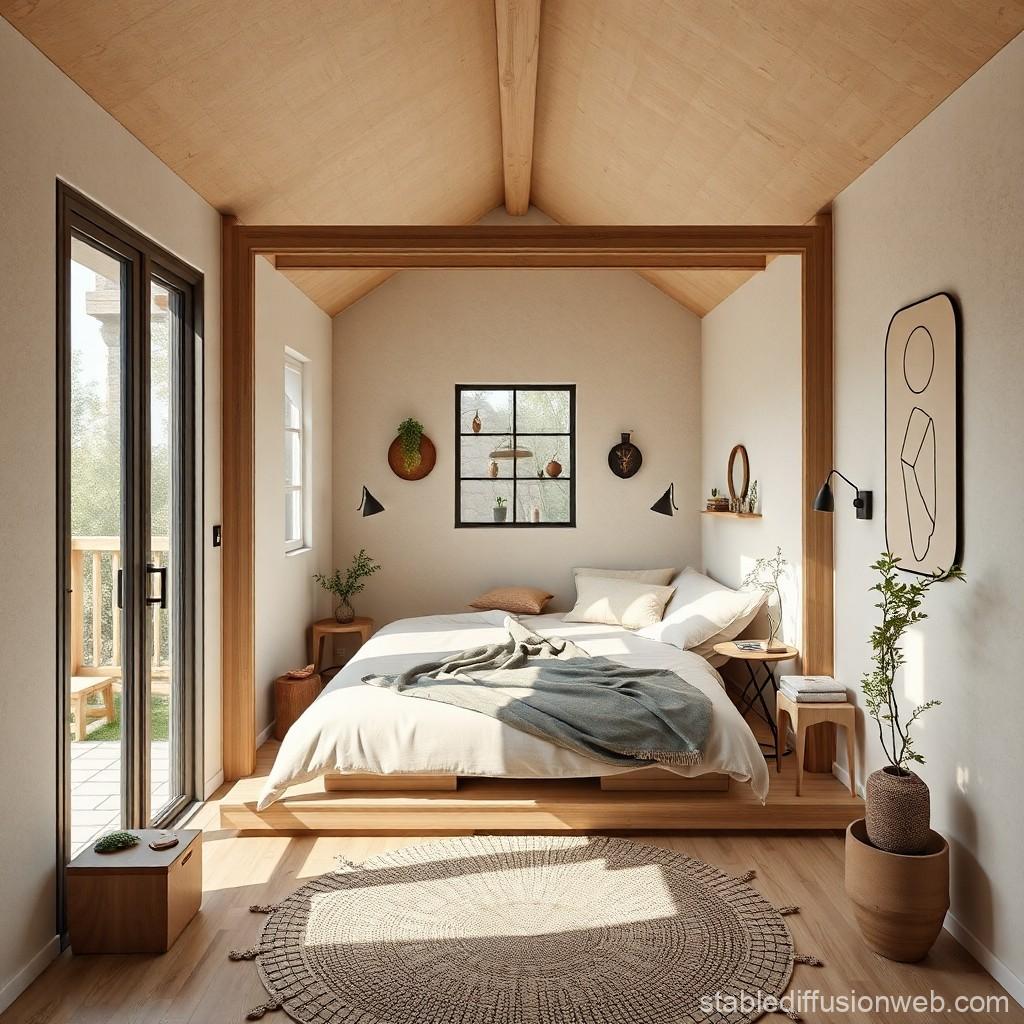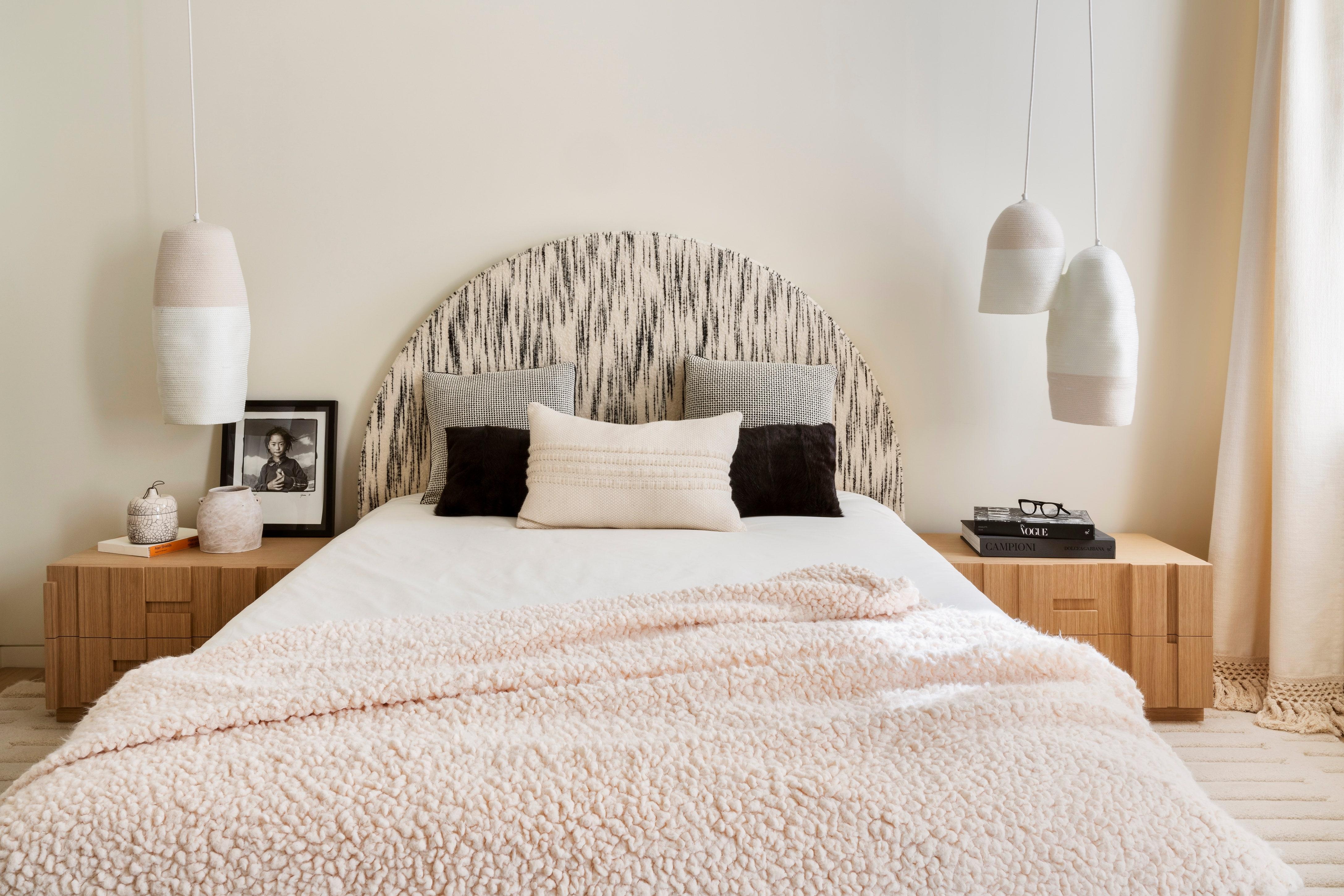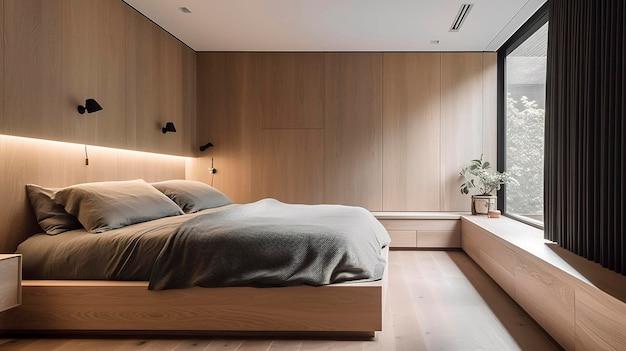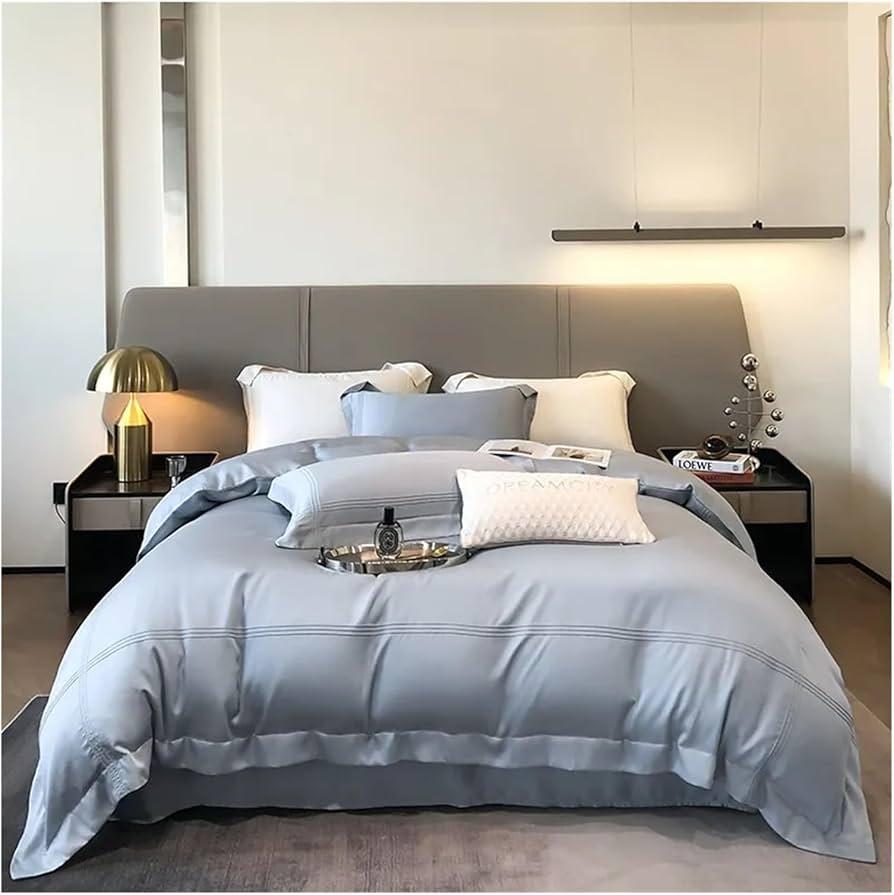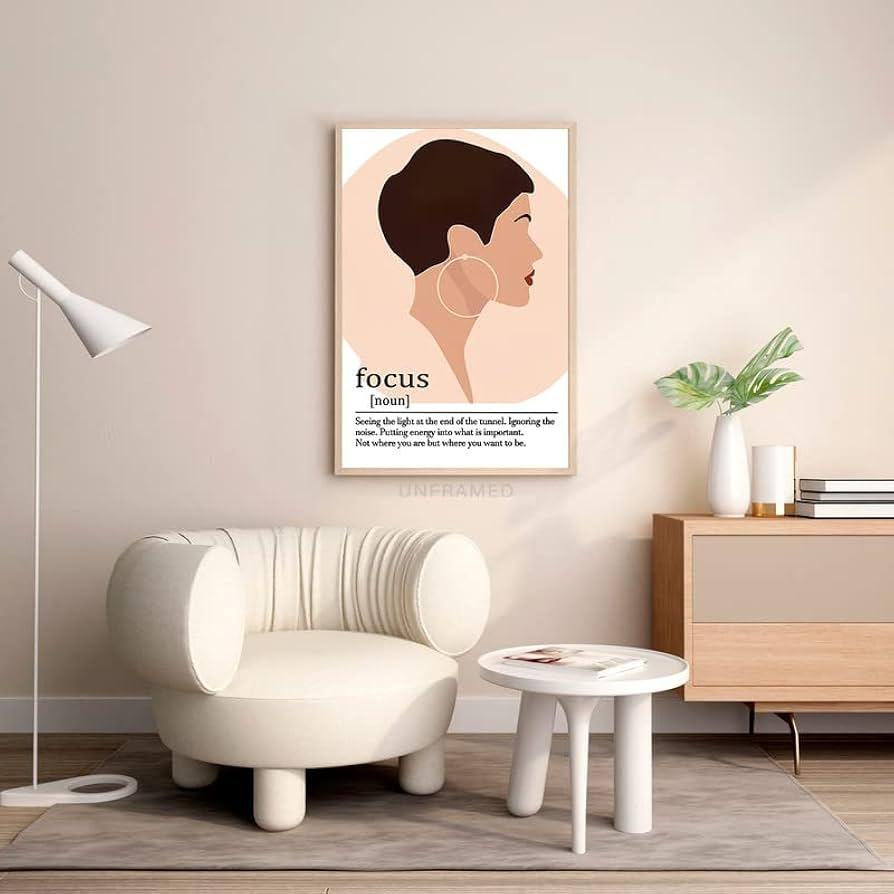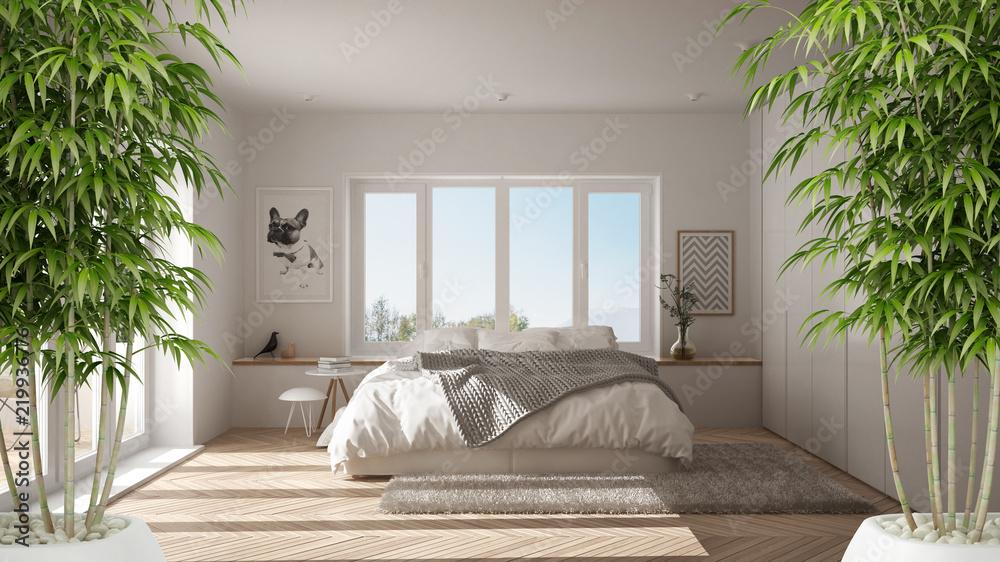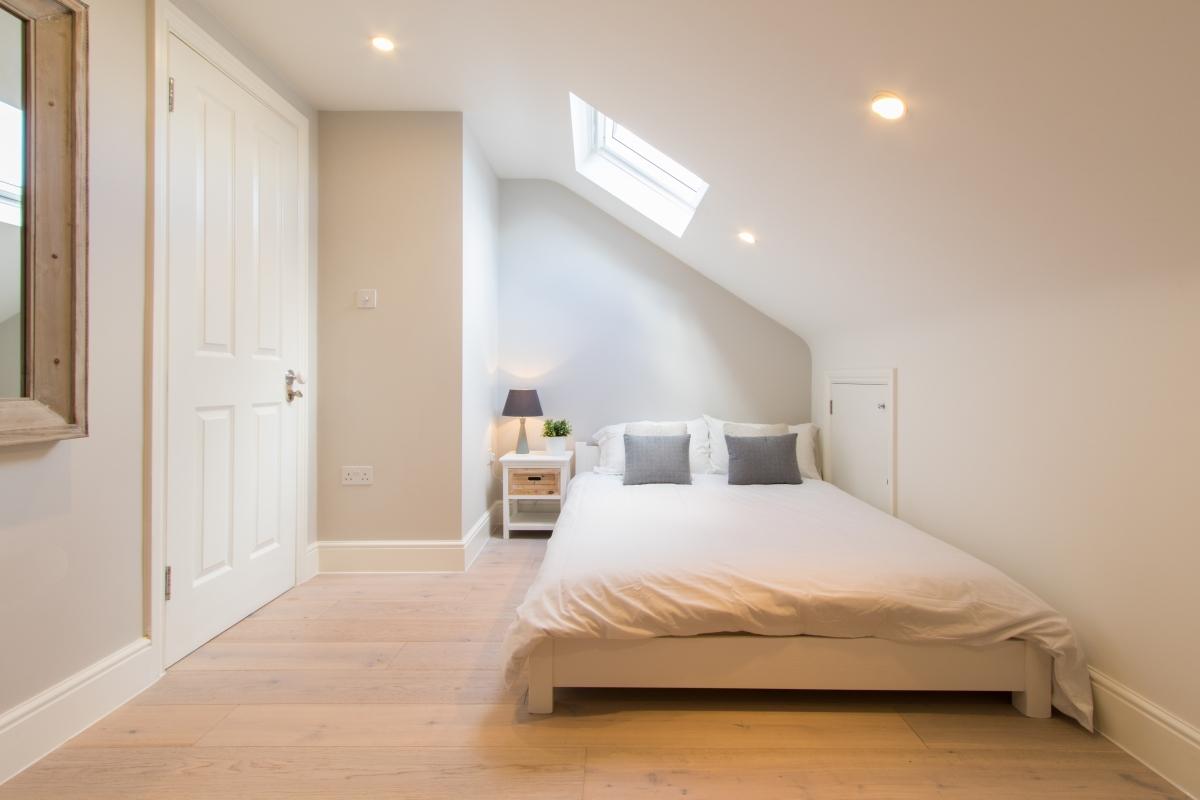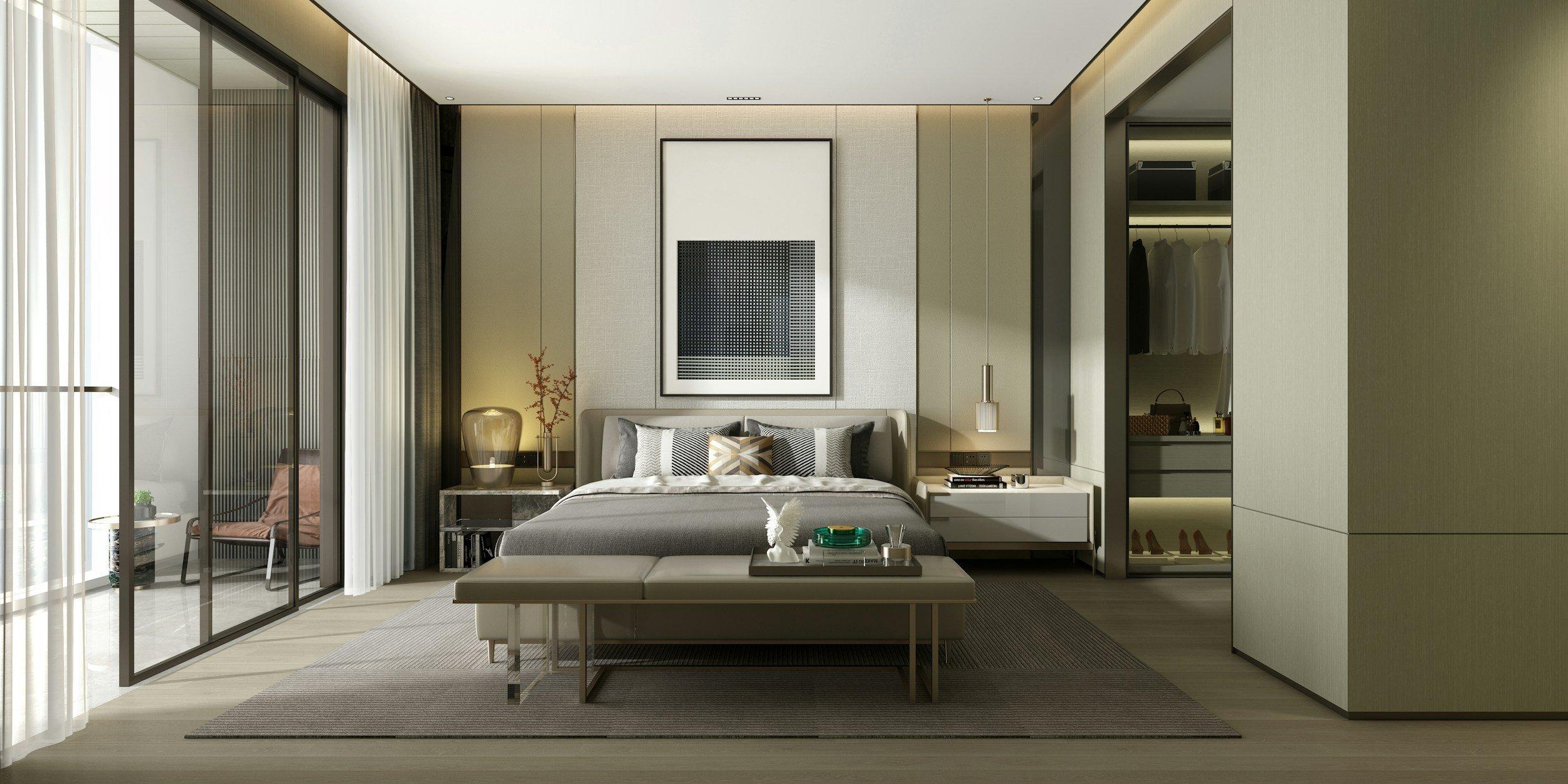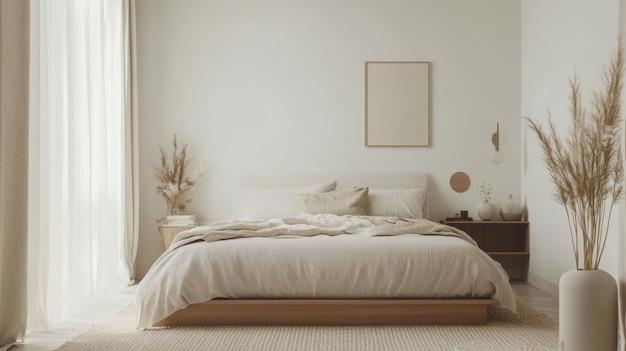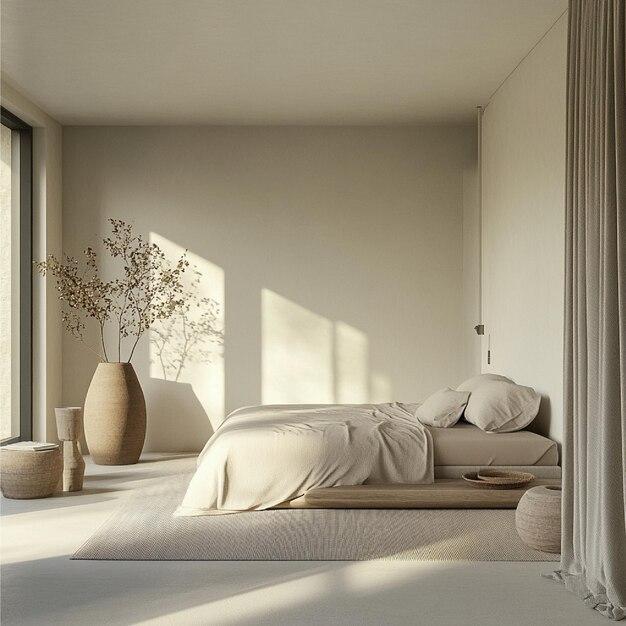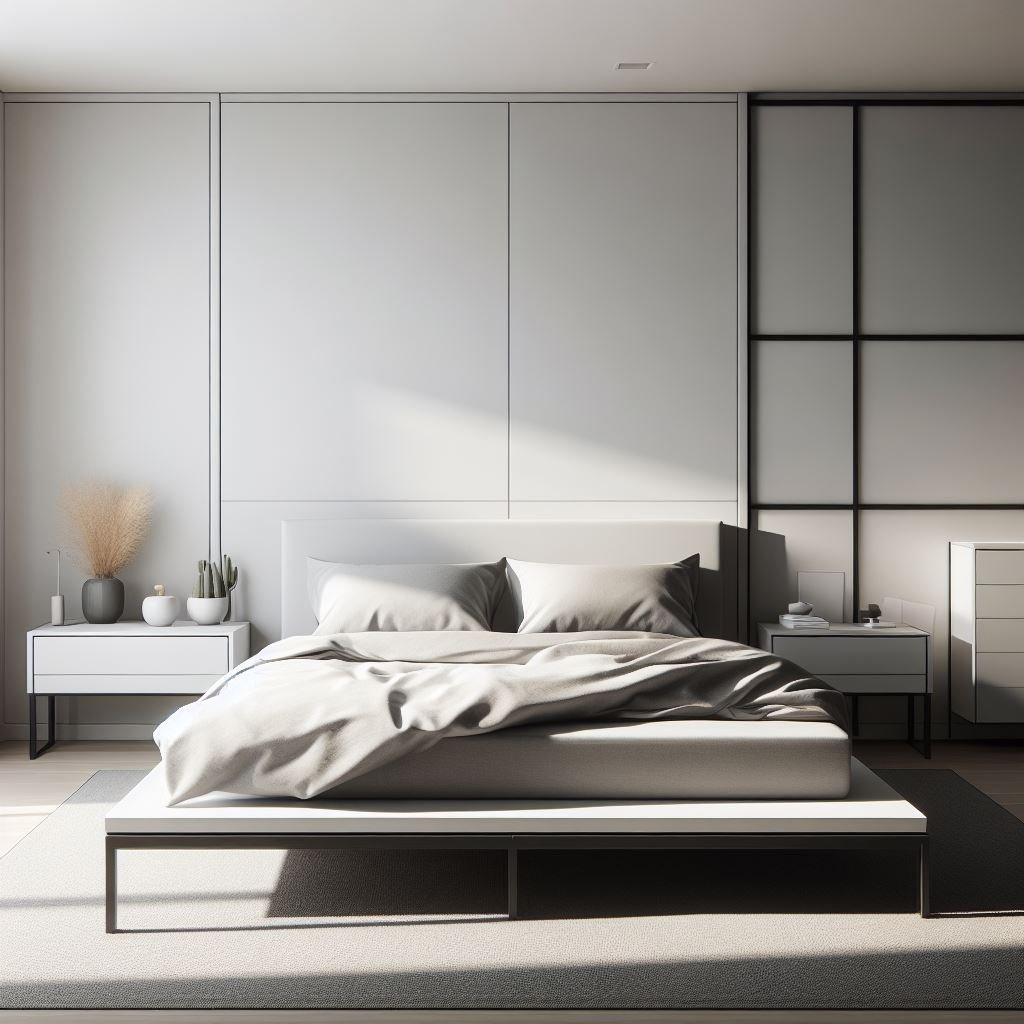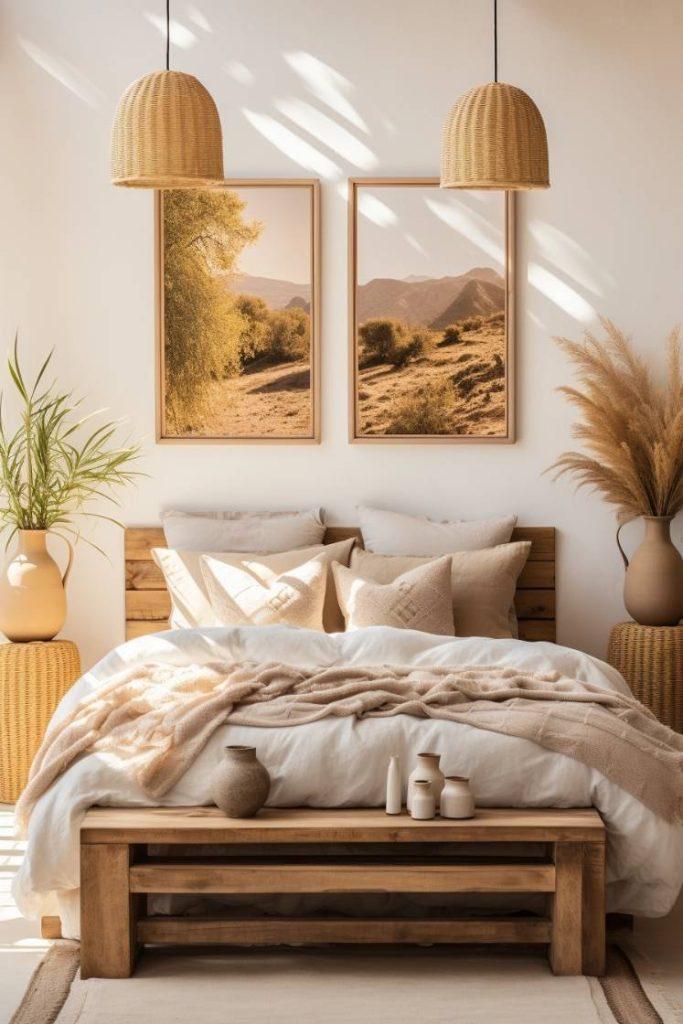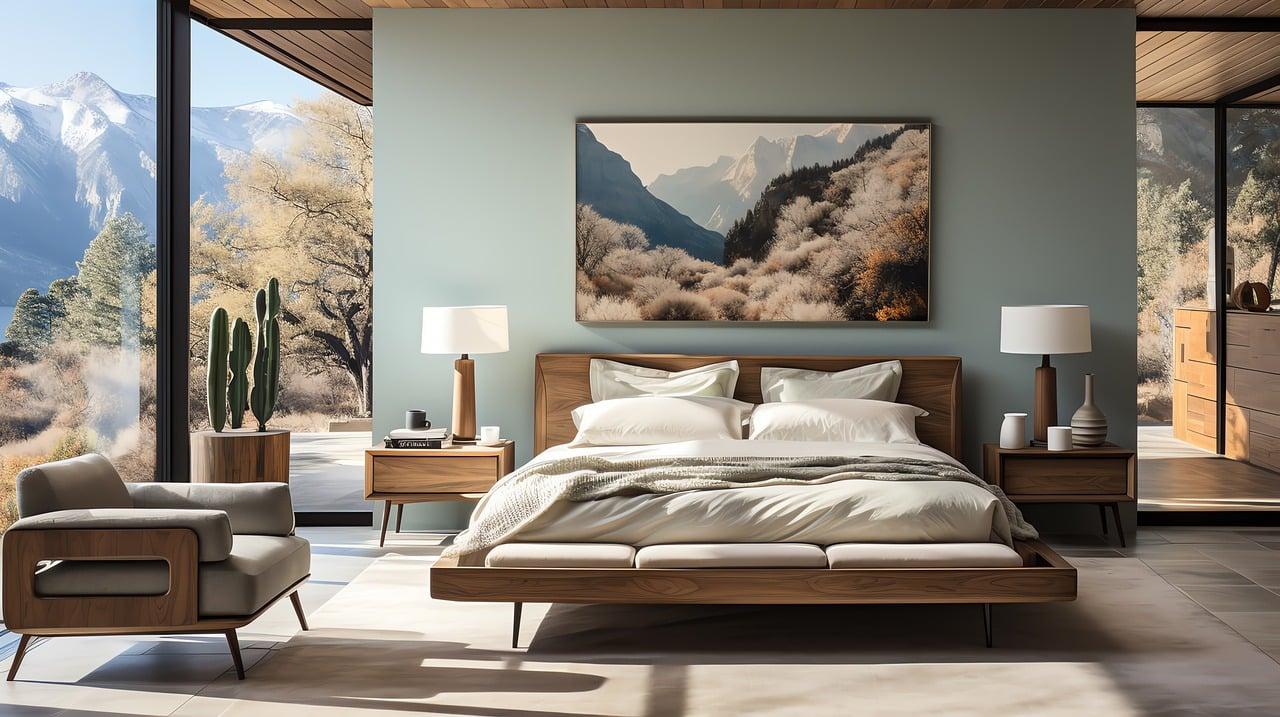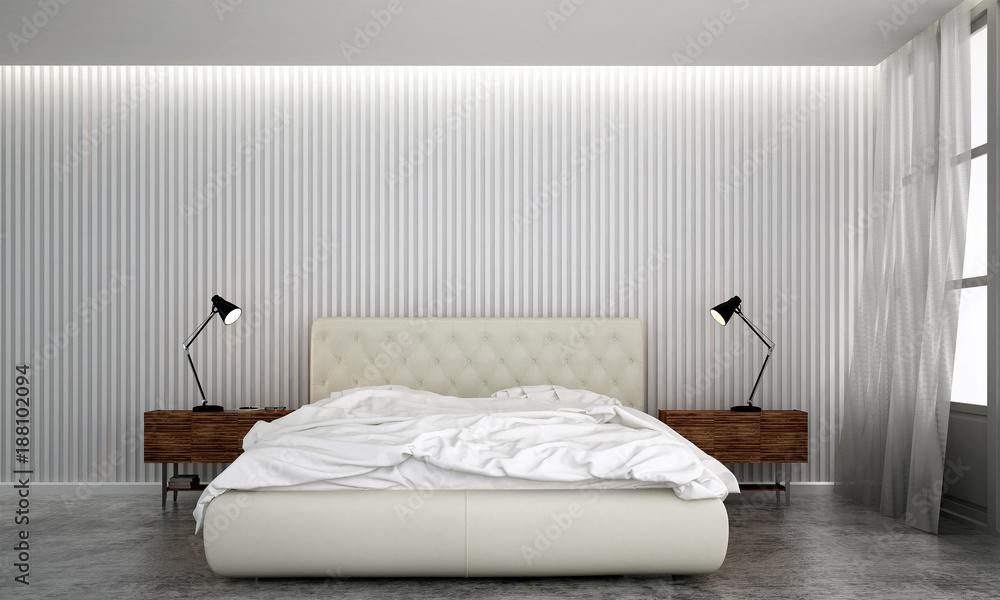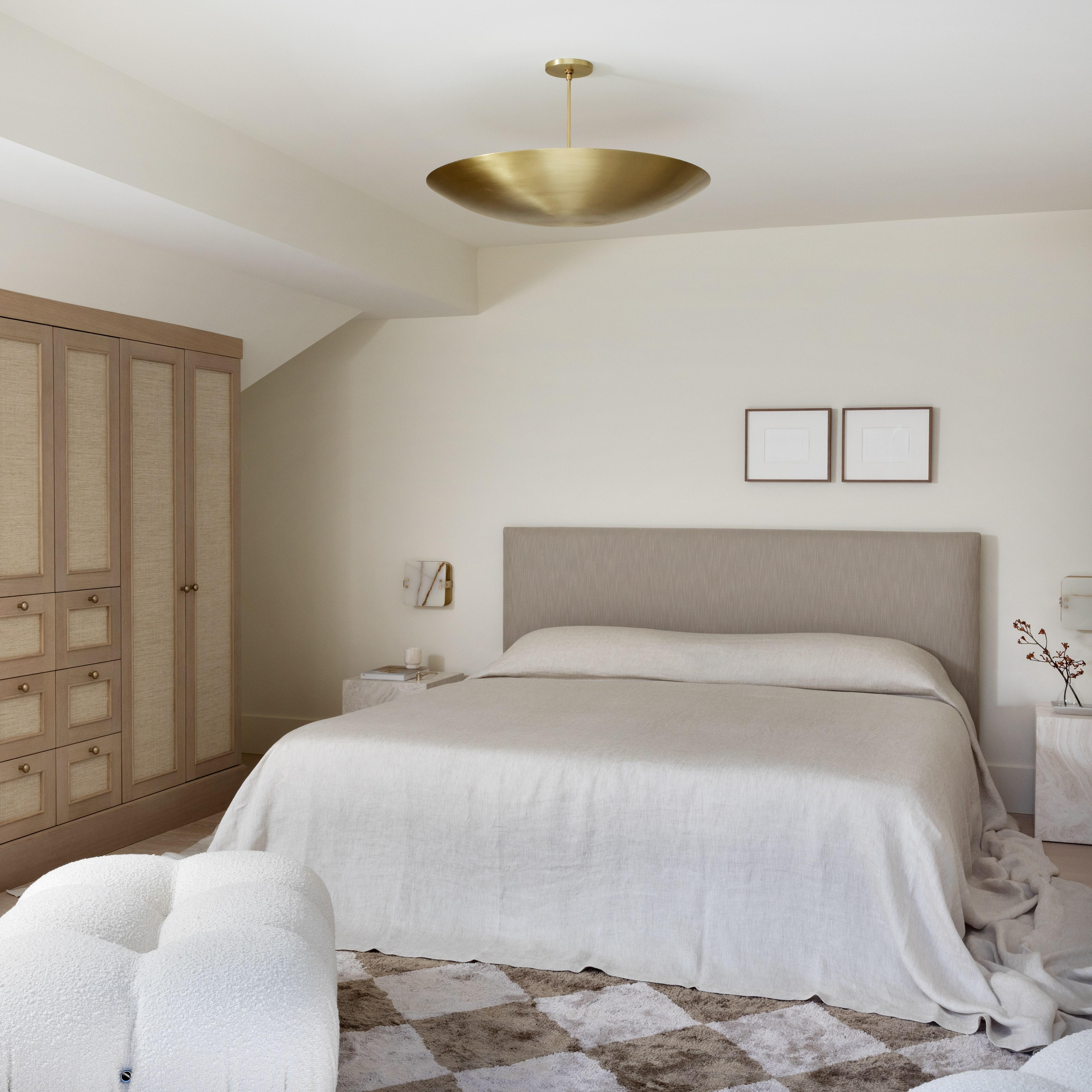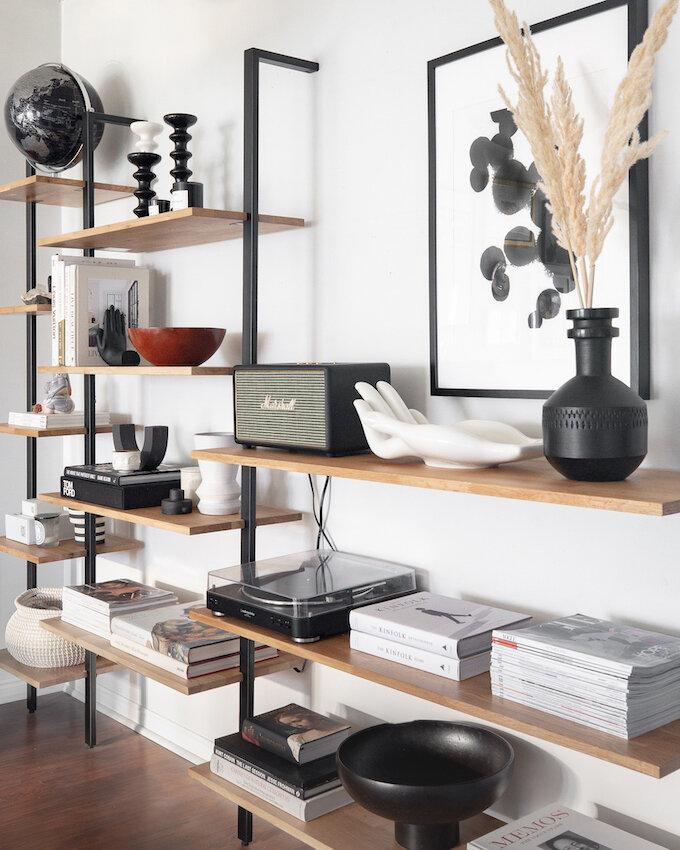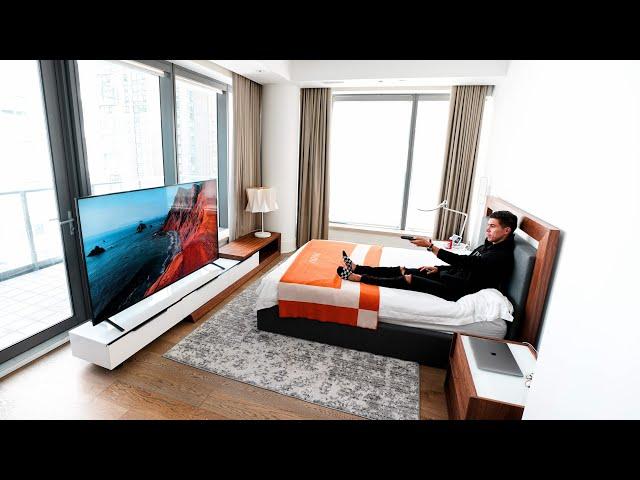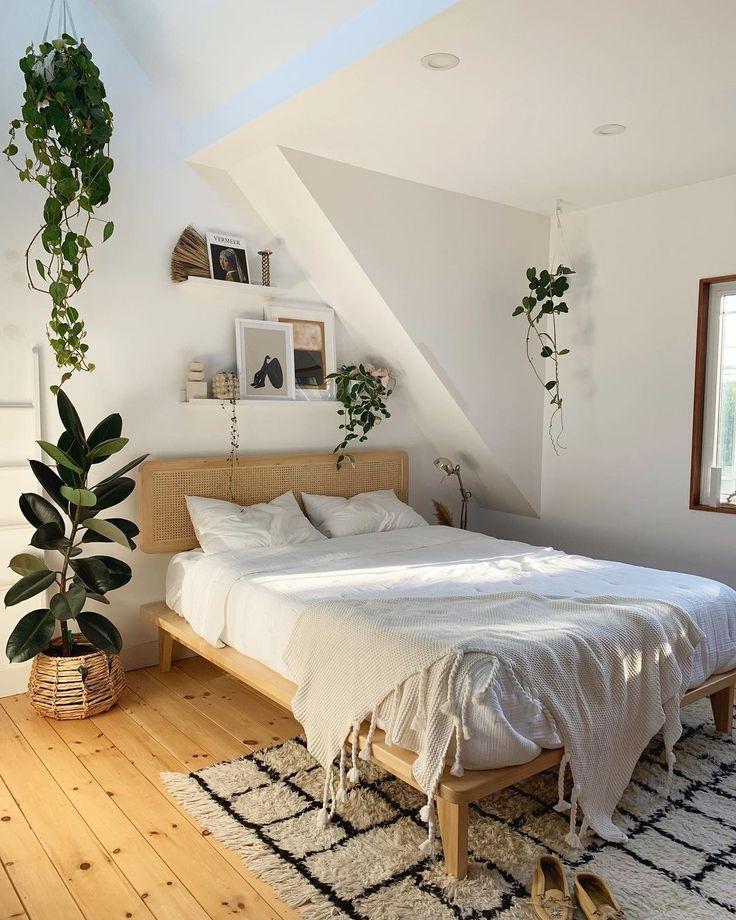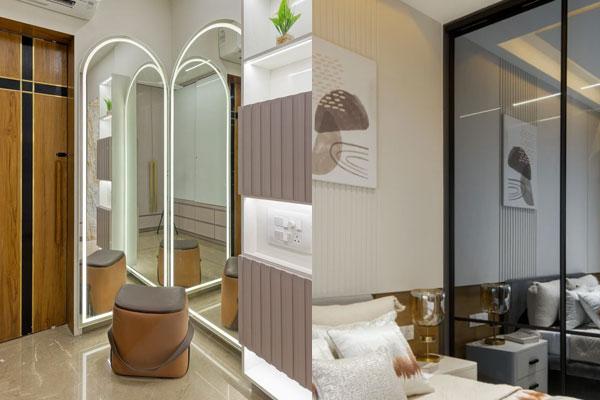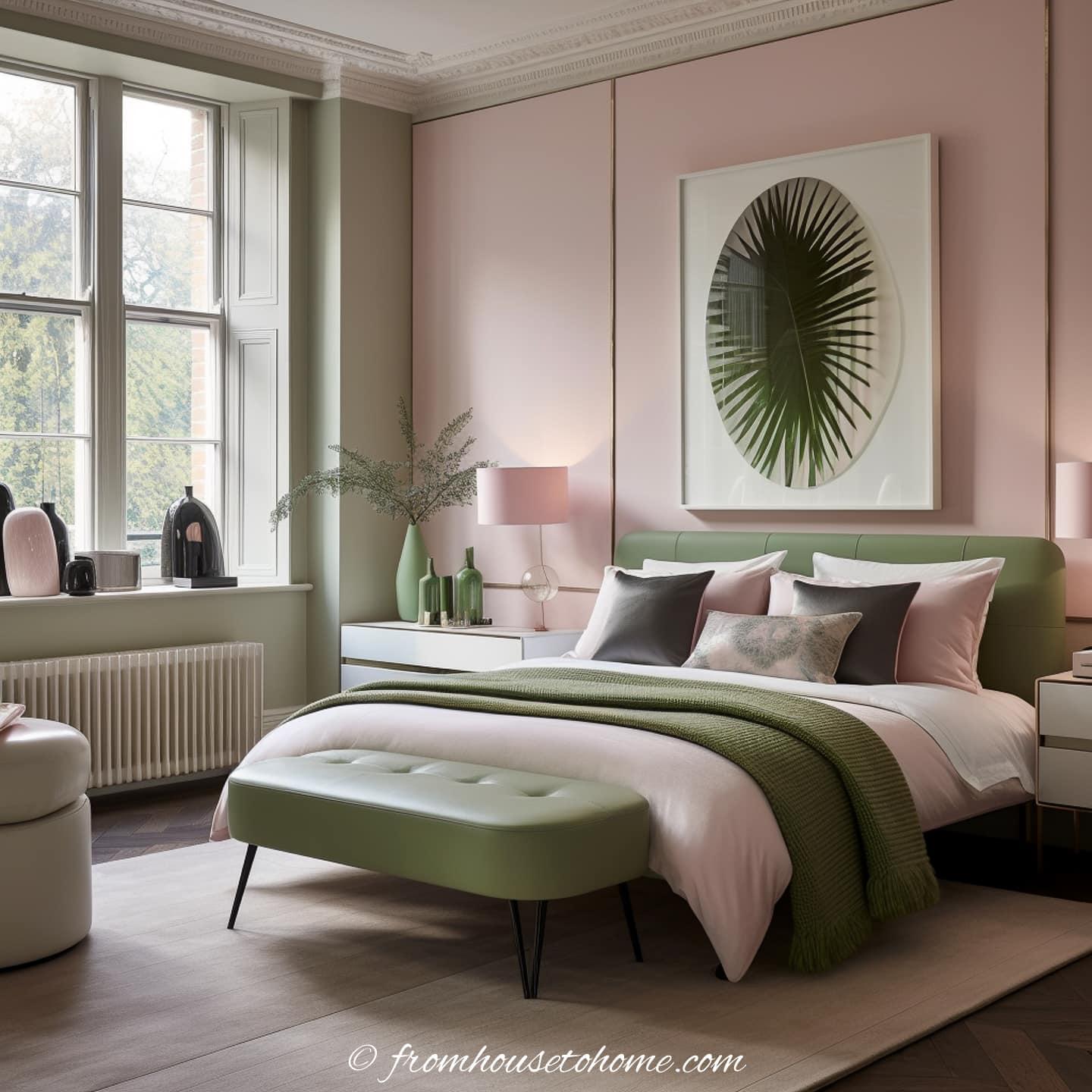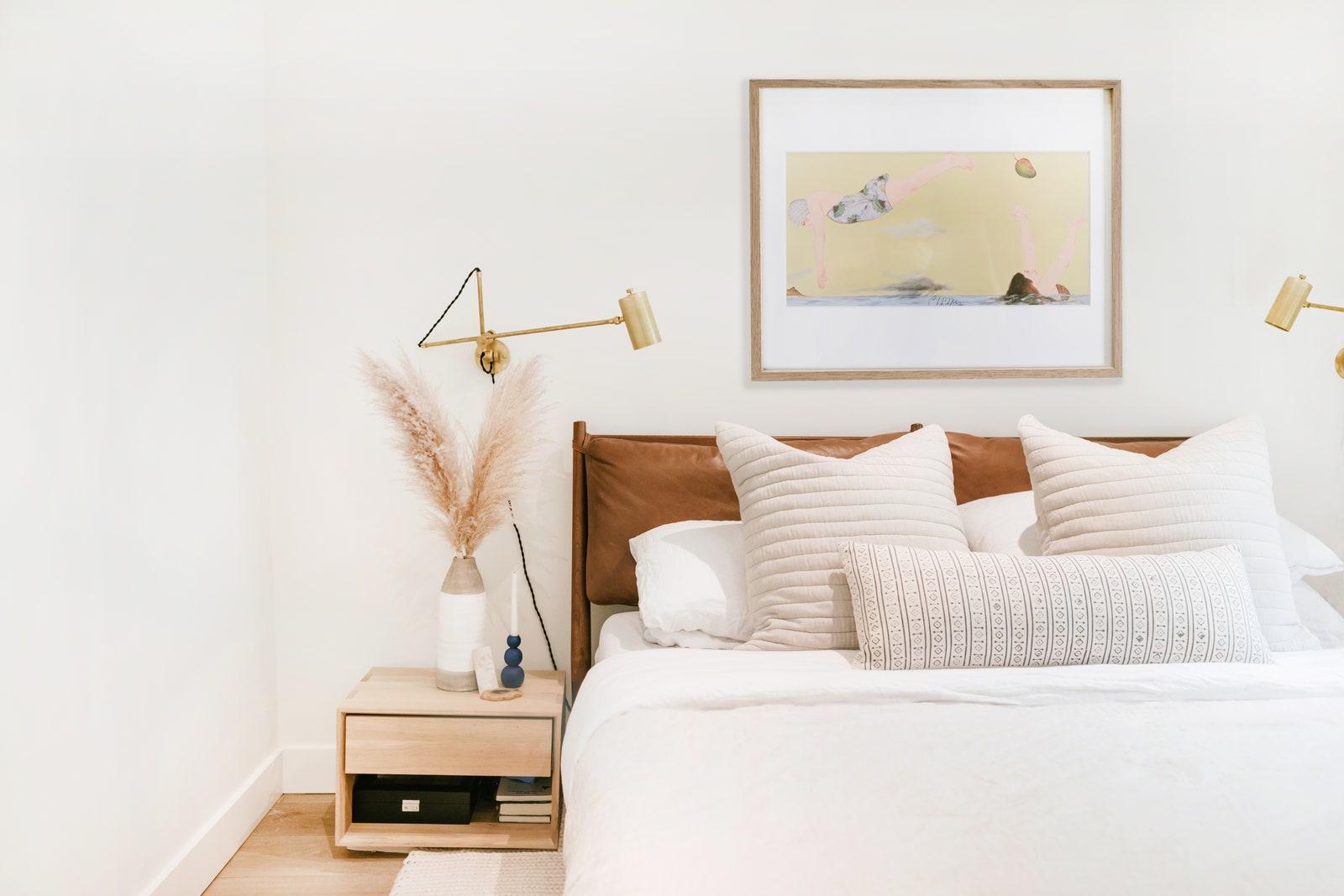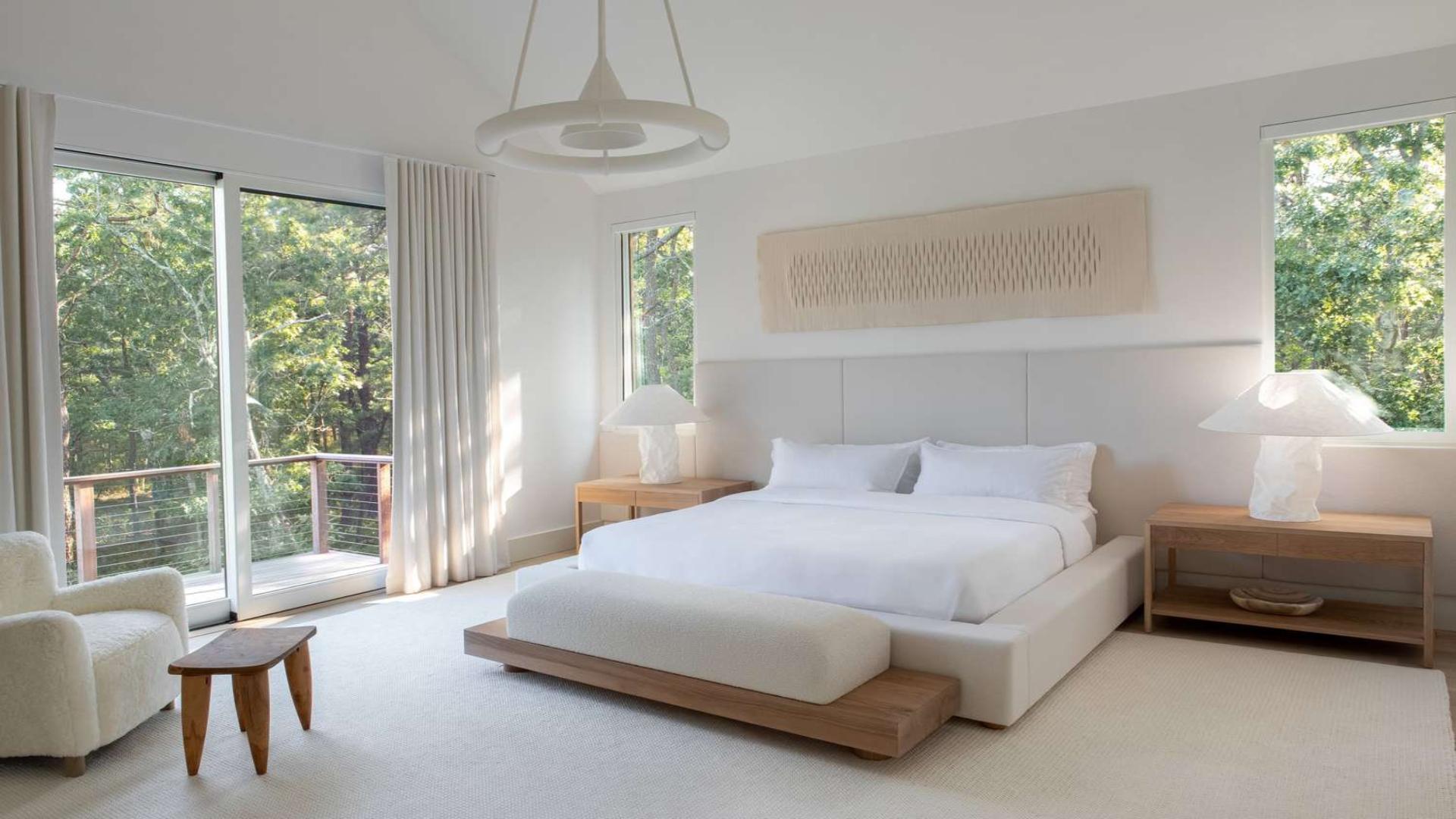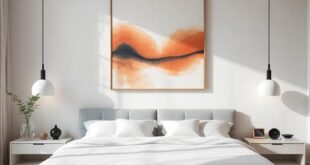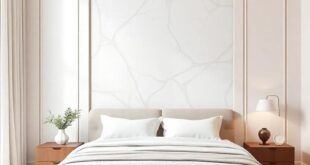Creating a serene and inviting space is essential for a good night’s sleep, and what better way to achieve this than through minimalist bedroom design? In our fast-paced world filled with constant stimuli, a minimalist approach allows us to carve out a sanctuary that emphasizes simplicity and tranquility. In this listicle, we’ve curated 24 essential tips to help you design a minimalist bedroom that not only looks stunning but also promotes relaxation and well-being. From choosing the right color palette to selecting functional furniture pieces, each tip is aimed at guiding you toward a serene personal retreat. Whether you’re starting from scratch or looking to declutter your existing space, you’ll find practical advice and inspiration to transform your bedroom into a minimalistic haven. Get ready to discover how less truly can be more!
Choose a neutral color palette for your minimalist bedroom
When designing a minimalist bedroom, one of the most crucial elements is the color palette. A neutral color scheme creates a serene environment that fosters relaxation and simplicity, which are hallmarks of minimalism. Consider utilizing shades such as soft whites, gentle grays, muted beiges, and cool taupes. These tones provide a perfect backdrop, allowing other elements in the room—such as furniture and decor—to shine without overwhelming the senses. Additionally, a neutral palette enhances natural light, making the space feel more open and airy.
Incorporating texture is key when working with a muted color scheme. To achieve visual interest, mix various materials in the same serene tones. Think of a soft wool throw, smooth linen bedding, and textured jute rugs. This layering effect enriches the space without disrupting the minimalist ethos. To further embody simplicity, you can curate the decor by selecting a few standout pieces, such as a single piece of art or a simple vase, to maintain the uncluttered aesthetic. Remember, less is more in a minimalistic design, so embrace the power of a refined neutral palette. For more inspiration, visit dwell.com.
Invest in multifunctional furniture to save space in your minimalist bedroom
- Beds with Storage: Invest in a bed frame that includes built-in drawers or a lift-up mattress for storing linens, clothes, or other belongings. This dual-purpose design not only saves space but also keeps your essentials organized and out of sight.
- Convertible Sofa: A sofa that transforms into a bed provides both seating and sleeping options. Perfect for accommodating guests without compromising on style, these versatile pieces blend seamlessly into a minimalist aesthetic.
- Nested Tables: Choose end tables or coffee tables that can be nested together, allowing for flexibility in your layout. When not in use, simply slide them under each other to free up floor space.
- Desk and Shelf Combos: A wall-mounted desk that doubles as a shelf creates a workspace that doesn’t take up additional room. This frees up valuable floor space while still providing a functional area for work or study.
- Ottomans with Storage: Use ottomans that open up to reveal hidden storage space. These can serve as additional seating or a place to put your feet up while also safely holding items like books and blankets.
| Furniture Type | Functionality |
|---|---|
| Bed with Storage | Sleep + Store |
| Convertible Sofa | Seat + Sleep |
| Nesting Tables | Flexibility + Organization |
| Desk/Shelf Combo | Work + Store |
| Storage Ottoman | Seat + Hideaway Storage |
By strategically selecting multifunctional pieces, you can maximize your space while maintaining a clean and organized look. Focusing on furniture that performs double duty allows you to embrace the minimalist design principles of simplicity and functionality. For more inspiration on minimalist furniture solutions, explore [dwell.com](https://dwell.com).
Prioritize natural light to enhance your minimalist bedroom’s ambiance
Maximizing the use of natural light can drastically elevate the atmosphere of your minimalist bedroom, giving it a serene and airy feel. Consider large windows that invite sunlight during daylight hours, which not only brightens the space but also reduces the reliance on artificial lighting, creating a harmonious connection with nature. If privacy is a concern, sheer curtains can offer a solution, allowing sunlight to filter in while maintaining a soft ambiance. Reflective surfaces such as mirrors or glossy furniture can also help in enhancing natural light, making the room feel more spacious and open.
Furthermore, the color palette you choose plays a vital role in how light is perceived in your space. Opting for neutral tones on walls and furnishings can amplify the effect of natural light, allowing it to bounce around the room. Incorporate plants strategically near windows to enhance the freshness of the environment while benefiting from the light. For more inspiration on adding natural light elements to your bedroom, explore resources at Architectural Digest. By thoughtfully organizing your space, you can create a minimalist bedroom that feels bright and inviting, effortlessly enhancing both its functionality and aesthetic appeal.
Keep decor simple to maintain a peaceful minimalist bedroom vibe
When it comes to creating a minimalist bedroom, the essence lies in simplicity. This means choosing decor that enhances the tranquility of the space without overwhelming it. Simplistic wall art, such as a single large canvas or abstract pieces, can serve as a focal point while keeping the overall aesthetic uncluttered. Opt for a muted color palette that complements the natural light, allowing the room to feel airy and spacious. You can select decor elements like succulents or small potted plants that add a touch of life without requiring excessive maintenance.
Consider using multifunctional furniture that blends seamlessly into the decor to maintain a serene ambiance. For instance, a minimalist nightstand with built-in storage can house books or personal items, ensuring that the surface remains clear. When picking out textiles, choose simple patterns or solid colors to maintain harmony. Incorporating soft, organic materials such as cotton or linen can enhance comfort while adhering to the minimalist theme. Lastly, ensure that any decorative items you choose to keep are meaningful and intentional, as they will contribute to the peaceful atmosphere of your sanctuary. For more inspiration on keeping it simple yet stylish, visit Apartment Therapy.
Use hidden storage solutions to declutter your minimalist bedroom
Embrace the art of concealed organization by incorporating hidden storage solutions into your bedroom design. Consider using furniture pieces that double as storage, such as ottomans, benches, and beds with built-in drawers. These versatile items not only contribute to a sleek aesthetic but also provide practical spaces to store your belongings. You can also look into over-the-door organizers for additional space that remains discreet yet accessible. Here’s a quick guide to some clever hidden storage options:
| Storage Type | Description |
|---|---|
| Storage Bed | Bed frames with drawers or compartments to stow away linens and seasonal clothing. |
| Under-bed Bins | Plastic or fabric bins that slide under the bed for easy access and out-of-sight storage. |
| Wall-mounted Shelves | Floating shelves for books and decor to keep surfaces clear while utilizing vertical space. |
Another innovative way to keep clutter at bay is by maximizing vertical space. Install wall-mounted cabinets or use decorative baskets that can be hung or placed on shelves to store items such as accessories and small items that can create visual chaos on your surfaces. Additionally, don’t underestimate the power of multi-functional furniture, such as side tables with hidden compartments or desks that fold away when not in use. These adjustments can help maintain the serene, uncluttered environment characteristic of minimalism. For more inspiration on clever storage ideas, check out Houzz.
Select bedding that complements the minimalist bedroom aesthetic
Choosing the right bedding is crucial in maintaining the sleek, uncluttered look characteristic of a minimalist bedroom. Opt for solid colors with soft textures that blend seamlessly into the overall palette. Think muted tones like whites, grays, or earth colors that convey serenity without drawing unnecessary attention. Consider materials such as cotton, bamboo, or linen for a clean aesthetic and comfort. Avoid overly intricate patterns that can disrupt the harmonious vibe; instead, focus on simplicity and refinement. You might even experiment with different textures using a mix of sheets, duvet covers, and throw blankets—all in a cohesive color scheme.
Incorporating layering techniques can also enhance the visual appeal without compromising minimalism. A basic yet sophisticated approach involves using a light duvet and a textured throw blanket casually draped across the foot of the bed. To add a touch of personality, consider accent pillows with varying shades of the same color palette; however, keep the number limited—three to five at most. Additionally, the bed frame and headboard should complement the bedding’s color and texture; choose wood or metal materials that reflect the streamlined aesthetic. For inspiration, you might explore designs showcased at thespruce.com.
Limit wall art to create focus in your minimalist bedroom
In a minimalist bedroom, the walls can either amplify tranquility or detract from it, making it essential to choose wall art wisely. Instead of overwhelming the space with numerous pieces, opt to limit your selections to a few meaningful items that truly resonate with you. This might include a single statement piece, an oversized print, or a small collection of carefully curated frames that reflect your personal style. The goal is to create a focal point that draws the eye without causing distraction, encouraging a serene atmosphere where you can unwind and recharge.
When selecting your wall art, consider both the color palette and the themes that align with the principles of minimalism. Choose artworks that use neutral tones to harmonize with your overall bedroom design, or, if you prefer a pop of color, limit it to one bold piece. Additionally, think about utilizing negative space effectively around your art to allow it to breathe. This approach not only emphasizes the beauty of each piece but also creates a calming ambiance. For inspiration on minimalist wall art design, visit Apartment Therapy for a plethora of ideas that can help transform your bedroom into a serene retreat.
Incorporate plants for a touch of nature in your minimalist bedroom
Infusing your minimalist bedroom with greenery can create a soothing ambiance while adding character without overwhelming the space. Choose plants that embody simplicity, like snake plants or ZZ plants, which require little maintenance and thrive in low light. Placing these in elegant ceramic pots can enhance the clean lines and neutral colors characteristic of minimalism. Arrange them atop a sleek dresser or beside a bed frame to draw the eye without cluttering surfaces. Consider incorporating a hanging plant to utilize vertical space; this can help maintain an open feel while ushering in a breath of fresh air.
You can also curate a plant corner with a mix of small pots for a varied texture that remains cohesive. Use a muted color palette for the pots to resonate with the minimalist aesthetic while creating a harmonious blend of nature and interior design. Incorporate a small table with plants to create a serene vignette that invites relaxation. This approach not only breathes life into your room but also contributes to improved air quality. For inspiration on plant types and care tips, check out The Sill, a great resource for plant lovers.
Stick to a few essential pieces in your minimalist bedroom
Creating a minimalist bedroom starts with the concept of “less is more.” By focusing on a select number of essential pieces, you allow your space to breathe and maintain an uncluttered aesthetic. Investing in quality over quantity is crucial. Consider the primary components of your bedroom: a comfortable bed, a functional bedside table, and a wardrobe that suits your storage needs. When choosing these items, look for designs that feature clean lines, neutral colors, and natural materials. This approach creates a harmonious environment that promotes relaxation.
Another way to enhance the minimalist vibe is to limit accessories and decorative items. Keep only those that resonate with you or serve a functional purpose. You might want to include:
- A single piece of art that reflects your style
- A cozy throw blanket for added comfort
- Essential plants that bring life without overwhelming the space
To help visualize this concept of a minimalist bedroom, consider this simple furniture checklist for a streamlined look:
| Essential Furniture | Functionality |
|---|---|
| Bed | Rest and relaxation |
| Bedside Table | Storage for nighttime necessities |
| Wardrobe | Organized clothing storage |
| Chair or Bench | Additional seating |
Focusing on these essential elements will help you create a stylish yet functional bedroom. For more inspiration on minimalist design principles, check out The Minimalists.
Choose quality over quantity for furniture in your minimalist bedroom
When creating a minimalist bedroom, it’s essential to focus on quality rather than sheer quantity when selecting your furniture pieces. Opt for a few well-crafted items that will stand the test of time, instead of filling your space with numerous inexpensive options that may compromise on style or durability. For example, a beautifully designed bed frame made from sustainable wood can serve as a striking centerpiece, inviting you to a serene night’s sleep without overwhelming the space.
Consider investing in multi-functional furniture that adds both aesthetics and practicality to your bedroom. Items like a stylish ottoman that doubles as storage or a sleek bedside table with ample drawer space can enhance the functionality of your room without cluttering it. Remember to select colors and materials that compliment your minimalist ethos, ensuring harmony throughout the space. With fewer, but higher-quality pieces, your bedroom will exude a refined charm, allowing you to create a personal sanctuary that’s truly yours. For inspiration on quality furniture pieces, visit dwell.com.
Create a serene focal point, like a bed, in your minimalist bedroom
One of the most impactful ways to embrace minimalism in your bedroom is by curating a serene focal point that naturally draws the eye and promotes tranquility. Consider selecting a bed that speaks to simplicity, such as a low-profile platform bed or a sleek modern frame designed from natural materials. The color palette can be muted—think soft whites, gentle greys, or earthy tones—to enhance the calming atmosphere. To elevate your focal point, layer soft textures like a smooth duvet cover and a few well-chosen throw pillows that maintain the minimalist aesthetic without overwhelming the senses.
To further cultivate serenity, ensure that the area surrounding your bed is equally uncluttered and inviting. Implement thoughtful storage solutions to keep books, accessories, and clothes neatly tucked away, maintaining a clean line of sight. You might also consider incorporating soft ambient lighting, such as stylish wall sconces or understated bedside lamps, to create a warm glow at night while avoiding harsh overhead lighting. Remember, a minimalist bedroom isn’t just about what you keep; it’s equally about what you choose to leave out, embracing the beauty of negative space. For more inspiration, visit Architectural Digest.
Use soft textiles to add warmth to your minimalist bedroom
In a minimalist bedroom, where simplicity reigns supreme, incorporating soft textiles can significantly transform the atmosphere, injecting a sense of warmth and comfort. Consider layering various materials such as cotton, linen, and wool to create a cozy ambiance without overcrowding the space. You might opt for a plush area rug underfoot to establish a focal point or drape a soft throw blanket over the bed for a touch of inviting texture. Neutral colors and subtle patterns work exceptionally well to maintain a clean aesthetic while still contributing to the room’s overall warmth.
Additionally, the choice of pillows can elevate the minimalist design from stark to soothing. A combination of different sizes and shapes can enhance visual interest while remaining true to the minimalist ethos. For example, oversized cushions paired with smaller, decorative pillows create an inviting nook on the bed. Don’t forget to explore options like velvet cushions or knitted pillow covers that can introduce tactile diversity. The key is to focus on quality over quantity, ensuring that each piece harmonizes with the minimalistic concept. For more inspiration on incorporating textiles effectively, you can visit Apartment Therapy.
Keep surfaces clear to enhance the minimalist bedrooms spacious feel
To cultivate a serene atmosphere in your bedroom, it’s essential to maintain clear surfaces. This not only enhances the spacious feel of the room but also promotes mental clarity. Begin by evaluating your furniture choices and ensuring they serve a purpose. Opt for items that provide storage solutions while remaining sleek in design. Consider incorporating built-in shelves or simple nightstands with drawers to keep essentials tucked away and out of sight. The goal is to create a sanctuary that feels open and is free from clutter, allowing for a more restful environment.
In addition to furniture, be mindful of decorative items. Limit personal decor to a select few cherished pieces to avoid overwhelming the senses. Use simple organizers for small items, ensuring they blend seamlessly with the room’s color palette. Wall-mounted hooks can also be an effective solution for stowing away bags or accessories without monopolizing surface space. By fostering an uncluttered surrounding, you can effortlessly amplify the minimalist aesthetic. For more insights on creating a peaceful retreat, check dwell.com for design inspiration.
Opt for light wood or metal finishes in your minimalist bedroom
When designing a minimalist bedroom, the choice of materials can have a profound impact on the overall aesthetic. Opting for light wood or metal finishes strikes a perfect balance between simplicity and elegance. Light wood, such as birch or maple, not only brightens up the space but emanates a warmth that invites relaxation. Coupled with the sleek lines of metal finishes, you create an airy and open environment that fosters peace and tranquility. Consider furniture pieces that blend these elements, such as a light wooden bed frame paired with metal nightstands or accents.
Additionally, using these finishes can enhance the room’s functionality while keeping it visually appealing. Minimalist design thrives on fewer but substantial pieces—this means choosing furniture that serves a purpose without unnecessary embellishments. Light wood provides a natural texture, while metal adds a touch of modernity. Combine different shades and materials to create contrast, but remember to keep it cohesive to avoid visual clutter. For more inspiration on incorporating minimalist design elements into your space, check out Architectural Digest.
Maintain consistency in design elements across your minimalist bedroom
Achieving a cohesive look in a minimalist bedroom relies heavily on the consistent use of design elements. Start by establishing a color palette that resonates with the calming atmosphere typically associated with minimalism. Neutral tones like whites, greys, and beiges are favored, but don’t shy away from adding a splash of color through accessories or artwork. To maintain uniformity, choose a few key colors and utilize them in various elements, such as bed linens, rugs, and decorative pillows. Additionally, consider the material and texture used in your furnishings; selecting similar finishes for your nightstands, dressers, and even lampshades helps create a harmonious look throughout the room.
When it comes to furniture, less is always more. Opt for pieces that mirror your chosen style and color scheme, ensuring that all items complement each other rather than clash. Pay attention to the scale of each item as well; for instance, oversized furniture can overwhelm small spaces while delicate accents can create a sense of balance. Incorporate lighting that aligns with your design ethos, as it plays a vital role in setting mood and atmosphere. Subtle pendant lights or sleek floor lamps can enhance the ambiance without distracting from the minimalist aesthetic. For more tips on creating a minimalist space, visit Apartment Therapy.
Limit patterns and textures for a cohesive minimalist bedroom look
To achieve a cohesive look in a minimalist bedroom, it’s essential to be selective with the patterns and textures you choose. Limit patterns to one or two types; this avoids visual clutter and creates a harmonious atmosphere. Opt for subtle designs like thin stripes or soft geometric shapes. When incorporating textures, focus on natural materials such as linen, cotton, or wool to add warmth while maintaining a clean aesthetic. Pair textiles carefully; for instance, a sleek duvet cover can be complemented by a cozy throw blanket but should avoid competing patterns to keep the space unified.
Consider utilizing a neutral color palette for a serene backdrop, allowing only a few key textures to stand out. A combination of a smooth, matte finish on walls alongside a textured fabric like a woven throw or a plush area rug creates a layered effect without overwhelming the senses. If you want to add an element of interest, think of incorporating a singular statement piece, such as a patterned cushion or a tactile wall art, which will serve as a focal point rather than scattering multiple elements throughout the room. A well-placed table with a natural wood finish can also marry different elements beautifully. For further insights on minimalist design, visit Apartment Therapy.
Select a statement lighting fixture to elevate your minimalist bedroom
In a minimalist bedroom, lighting plays a pivotal role not just in illumination, but also in enhancing the space’s overarching aesthetic. Opt for a striking statement lighting fixture that can serve as a focal point without overwhelming the rest of the room. Look for designs that exhibit clean lines and geometric shapes, as they echo the simplicity that minimalist design embodies. Consider materials like polished metal, matte finishes, or natural wood, which can seamlessly integrate into your bedroom’s decor while adding a touch of sophistication. A pendant lamp with an artistic flair or a sleek chandelier can transform your space dramatically, infusing it with personality without compromising its minimalistic ethos.
When selecting your fixture, think about the following elements:
- Scale: Choose a fixture that is proportionate to the room size; oversized options add drama, while smaller ones keep it subtle.
- Light Quality: Aim for warm LED bulbs to create a cozy atmosphere that enhances the tranquil vibe of your sanctuary.
- Placement: Position your statement lighting above the bed or in a central location to ensure it not only shines but also draws the eye.
For inspiration, browse through curated collections on sites like Lamps Plus, where you can find unique lighting options that can perfectly complement your minimalist bedroom style.
Integrate open shelving for functional style in your minimalist bedroom
Open shelving is a brilliant way to merge practicality with visual appeal in your minimalist bedroom. By utilizing open shelves, you can showcase your favorite books, plants, and decor, adding personality without overpowering the space. Consider floating shelves or slim profile units that maintain the airy feel typical of minimalist design. Position these shelves at eye level or higher to draw the gaze upward, creating an illusion of increased height and openness in your room.
To ensure that your open shelving remains functional yet stylish, organize items strategically. Group similar items together, such as a collection of books on one shelf, while another could feature decorative boxes or small potted plants. This method not only keeps things tidy but also enhances the overall aesthetic. Remember to leave some spaces empty to prevent a cluttered look and allow for easy access to everyday essentials. For more inspiration on incorporating open shelving effectively, explore resources at Apartment Therapy.
Hide technology to maintain tranquility in your minimalist bedroom
In a world dominated by screens and gadgets, achieving peace in your minimalist bedroom requires a careful approach to technology placement. Begin by choosing furniture that doubles as storage, effectively concealing devices like chargers, remote controls, and even the occasional tablet. Consider incorporating hidden compartments in your bedside tables or using decorative boxes to store miscellaneous tech. This way, the clutter often associated with technology is out of sight, allowing for a cleaner and more serene environment. Additionally, opt for cord management solutions such as clips or sleeves to keep cables organized and away from view, maintaining the aesthetic harmony of your sanctuary.
To enhance the calming atmosphere further, limit the presence of visible screens. Instead of surrounding yourself with TVs or computer monitors, explore options like artistic covers for larger electronics when not in use, or replacing bright displays with simple white or muted backgrounds. If you enjoy music or podcasts for relaxation, consider setting up a Bluetooth speaker that can be discreetly placed or even built into furniture. Emphasizing simplicity and mindfulness, this approach allows you to enjoy your favorite technology while ensuring it doesn’t dominate your space. For more insights on minimalist living, you can visit minimalism.com.
Choose a rug to define spaces within your minimalist bedroom
In a minimalist bedroom, where space and simplicity reign, a carefully chosen rug can serve as a powerful design element that defines separate areas within the same room. Consider using subtle textures and muted colors to create calm zones for relaxation, work, or reading. A large, soft area rug in a neutral tone can anchor the bed, while a smaller, contrasting rug near a reading chair or work desk can delineate that space. This layering of rugs not only adds visual interest but also promotes a sense of cozy functionality, making your minimalist design feel intentional and well-considered.
When selecting a rug, size, shape, and material are key factors that can enhance your minimalist aesthetic. Rectangular rugs can work well under a bed or a lengthy furniture arrangement, while round rugs can soften the look of a room filled with angular lines. Opt for natural materials such as wool or cotton for an inviting feel underfoot while keeping in line with the minimalist mantra of simplicity. Always remember to maintain a harmonious color palette, ensuring that your rug complements the overall decor for a cohesive look. For more inspiration on how to incorporate rugs into minimalist spaces, visit apartmenttherapy.com.
Use mirrors strategically to reflect light in your minimalist bedroom
Integrating mirrors into your minimalist bedroom design can elevate the overall ambiance while maintaining the simplicity that defines the aesthetic. By strategically placing mirrors, you can create an illusion of space and light, enhancing the serene environment. Consider the following ideas:
- Wall Mirrors: Use large wall mirrors opposite windows to bounce natural light around the room, creating a bright and airy feel.
- Accent Pieces: Incorporate smaller, decorative mirrors on shelves or nightstands to add visual interest without cluttering the space.
- Framed Art: Choose mirrors with minimalist frames that can double as artwork, allowing you to stick to your theme while elevating mood through light reflection.
The placement of mirrors is crucial for achieving optimal light reflection. Consider installing mirrors in corners or above furniture to maximize their effectiveness. Here’s a simple table to illustrate ideal placement:
| Placement | Effect |
|---|---|
| Opposite a window | Increases natural light in the room |
| Above the bed | Creates a focal point and enhances the feeling of space |
| In a corner | Brightens up darker areas and opens up the room |
By mindfully selecting and positioning mirrors, you’ll not only complement your minimalist design but also create a tranquil space that feels larger and lighter. For more inspiration on utilizing mirrors in your interiors, check out Architectural Digest.
Create a calming color gradient for your minimalist bedroom walls
Transforming your bedroom into a serene sanctuary can be achieved by employing a calming color gradient on your walls. Choosing a gradient allows for a smooth transition between hues, creating an ethereal backdrop that promotes relaxation. When you create this gradient, consider starting with subtle shades that evoke tranquility, such as soft blues, gentle greens, or muted lilacs. These tones work together to produce a peaceful ambiance, conducive to rest and rejuvenation. Pair the gradient with light, neutral furnishings to maintain the minimalist design ethos.
To ensure the gradient flows seamlessly, you might explore the ombre painting technique, where one color gradually fades into another. Before diving into the painting process, it’s a good idea to sketch out your vision or use digital tools to visualize how the colors will interact. Gather your materials, including painter’s tape, brushes, and a selection of your chosen colors. Consider the following suggestions to enhance your color gradient:
- Flooring: Use light-colored flooring to enhance the airy feel.
- Accent Pieces: Incorporate décor that echoes the gradient colors, such as pillows or rugs.
- Lighting: Install dimmable lights to adjust brightness according to the time of day.
As you design your tranquil space, you may find inspiration on platforms like Pinterest, where you can explore countless ideas on color schemes and minimalist designs. Consider creating a color palette on an online tool to help choose harmonious shades that complement your gradient for a cohesive look throughout the room.
Personalize with minimal accessories in your minimalist bedroom
In a minimalist bedroom, less is often more. To add a personal touch without overwhelming the space, consider incorporating a few thoughtfully selected accessories. Choose items that resonate with you, such as a piece of art that inspires calmness, or a decorative throw that introduces a pop of color. Items like ceramic vases or handwoven baskets can serve both aesthetic and practical purposes while keeping clutter at bay. Always aim for a cohesive color palette to maintain harmony throughout the room.
Another way to enrich your minimalist sanctuary is through natural elements. A small potted plant or a succulent can breathe life into the space without distracting from its simplicity. Diffusers with essential oils or a sleek candle can provide a sensory experience while enhancing the tranquil atmosphere. Pay attention to texture, as well; a cozy wool rug or soft linen curtains can contrast the clean lines of your furniture and add warmth to the overall design. For further inspiration on creating a serene space, check out Houzz.
Embrace negative space to highlight your minimalist bedrooms elegance
In a minimalist bedroom, the art of negative space is essential for creating a sense of tranquility and balance. By purposefully leaving areas empty or unadorned, you allow the eye to rest and give structural importance to the furniture and decor you choose to showcase. Large, open floor spaces can highlight a beautifully crafted bed or a unique piece of art, creating a focal point without overcrowding. Incorporating neutral wall colors enhances this effect, making the existing items pop while fostering a calm atmosphere. Consider implementing mirrors to amplify negative space; they can reflect light and visually expand the room without adding clutter.
To further emphasize this elegant simplicity, opt for minimal yet intentional decor. A single vase with fresh flowers or a framed art piece can serve as striking accents against a backdrop of emptiness. When selecting furniture, prioritize multi-functional pieces that don’t dominate the room, such as bed frames with built-in storage that reduce the need for additional furnishings. Creating zones of emptiness around these elements can enhance their presence, allowing your space to breathe and feel more inviting. For more inspiration on minimalist design principles, visit Architectural Digest.
Wrapping Up
As you embark on your journey to create the perfect minimalist sanctuary, remember that simplicity is not just a style—it’s a state of mind. By integrating these 24 essential tips into your design process, you’re not only decluttering your space but also nurturing a sense of calm and clarity. Whether it’s selecting a muted color palette, choosing multifunctional furniture, or embracing natural light, each decision you make can enhance the tranquility of your bedroom.
Minimalism is about creating an environment that reflects your values and promotes well-being. As you curate your space, allow your personal touch to shine through, transforming the bare essentials into a haven that resonates with peace and efficiency.
So, take a moment to breathe, visualize your ideal retreat, and implement these strategies to foster a minimalistic lifestyle. Here’s to restful nights and serene mornings in your beautifully designed minimalist bedroom!
As an Amazon Associate I earn from qualifying purchases.
 decorafit.com Design ideas for your home and patio
decorafit.com Design ideas for your home and patio
